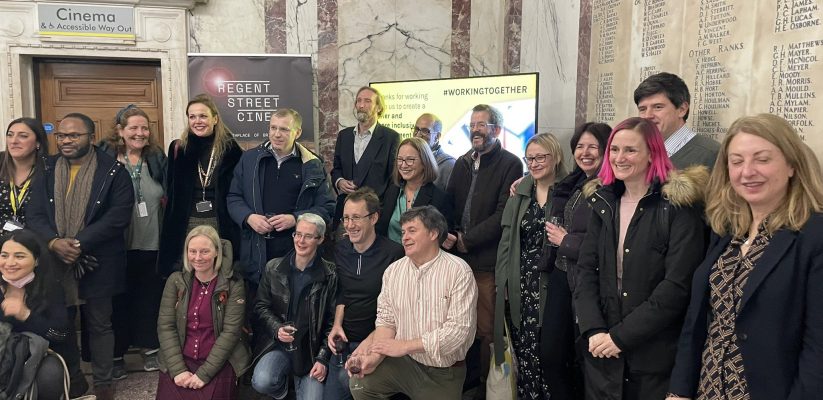Author: Professor Miriam Dwek, College Director – Research and KE, University of Westminster
It was an incredible privilege to be able to reflect on my journey as a cancer researcher during my inaugural lecture yesterday evening. To be to be surrounded by so many friends, family, colleagues and collaborators was really fabulous. It was a great opportunity to be able to think about what has been achieved and to recall how far along the road I have travelled. It is fair to say that I was nervous about giving this talk because I am very aware that so many people have been involved and have supported me along the way – I hope during my talk I was able to show that appreciation adequately. I also hope that I was able to show that one does not necessarily have to be a top notch (first class) student to have a career in research – the personal attributes that I think are important include curiosity, tenacity and the ability to take opportunities when they arise. I also think a good dollop of serendipity helps too!
My research has been concerned with changes associated with aggressive breast cancer and other solid tumours. Most mortality after breast cancer occurs as a result of the secondary spread of cancer from the breast to other parts of the body and I started off working in this area. I focussed on breast cancer which is the most common cancer in women with approximately 56,000 new cases diagnosed in the UK alone each year. There are approximately 1000 deaths per month as a result of breast cancer in the UK. However, we should take some succour from the knowledge that approximately 76% of all patients diagnosed with breast cancer are alive and well 10 years post diagnosis. Whilst we know a lot about breast cancer there is still much that we need to understand, for example, there is a need to identify which patients will respond to particular treatments as well as to identify new markers that allow other treatment modalities to be developed.
In terms of the ‘peculiar stickiness of cancer’. By the early 1990s there was a recognition that all cells have a coating of sugars on their surfaces. Often these complex sugars could be altered in cancer. These alterations were detected in many of the studies using carbohydrate binding proteins known as lectins. A range of lectins with binding properties for different complex sugars allowed changes in the ‘stickiness’ of cancer cells to be examined. My work built on that which had already been undertaken in the Department of Surgery at UCL by Anthony Leathem and Susan Brooks. I initially worked to identify complex sugars found in aggressive breast cancer. I was awarded my PhD and then did two stints of postdoctoral work on this same topic before being appointed as Lecturer at the University of Westminster in 2002. I was happy to be able to establish a laboratory at the university. We discovered that the peculiar sugars were found on the same proteins in both colorectal and breast cancer. We also discovered that these sugars are present in early colorectal cancer meaning that they are useful markers of the disease.
We also spent a lot of time developing new methods for studying breast cancer so that we could study the cancer in a way which was much more physiologically relevant. This work has been in conjunction with materials scientists and computational biologists who have helped us model stiffness and fluid flow and pressures within tumours. We found that when cancers are grown in three dimensions, surrounded by connective tissue proteins, they are much more resistant to drug treatment than cancers that are grown flat on plastic surfaces. In fact, it is possible to cure cancer when you grow the cells on plastic, but not when they are grown in 3D. Adding fluid flow and pressure renders cancer cells less responsive to chemotherapy drug treatment. This exciting finding is now being used in the lab as a method for screening new anti-cancer agents.
In another study we found that if we reduce the sugar coating on the surface of cancer cells then that makes the cancer cells more amenable to both chemotherapy and biological treatments. We are moving forward with this work and are really excited about testing new types of inhibitor compounds that will be able to alter the sugars on the cancer cell surface. There’s a great need to have laboratory systems that allow us to monitor how drugs bind to cancer cells and to test different patient samples, something we are pioneering in the lab and it was an honour to be able to present some of the latest work we have been doing in this area.
As a final thought, we live in an age where information is all around us, working with computational biologists as well as nutritionists and others is the next step in my cancer research journey. We are using ‘big data’ to try to understand what patients might be able to do for themselves to aid in their recovery from this disease.
Author: Professor Miriam Dwek of the College of Liberal Arts and Sciences, and College Director of Research and KE is a passionate exponent of equality and diversity issues having juggled her career whilst having children and both herself and partner working full time. Her Cancer Research focus remains harnessing the glycosylation changes evident in cancer. Over the last two decades the bulk of her research has concentrated on investigating and developing improved biomarkers and improving the action of anti-cancer agents by investigating the role of glycosylation inhibitors as anticancer agents.
- Obesity as a genotoxic environment - April 28, 2023
- Dalit History Month and its significance - April 20, 2023
- A professor is going to live in an underwater hotel for 100 days – here’s what it might do to his body - April 13, 2023
